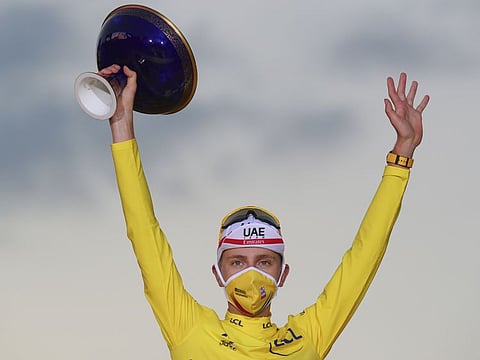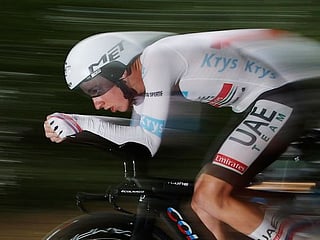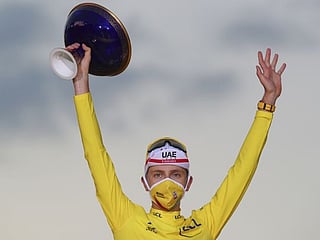Cycling: UAE’s birthday boy Tadej Pogacar wins Tour de France, capping dramatic comeback
UAE Team Emirates hero rides into the record books

Paris: Tadej Pogacar on Sunday became the youngest champion to win the Tour de France in the post-World War II era, a day after the UAE Team Emirates cyclist took the yellow jersey off the shoulders of his friend and rival Primoz Roglic in an epic time trial that rewrote the ending of a one-of-a-kind, pandemic-delayed edition of the world’s most famous cycling race.
Pogacar, who turned 22 on Monday, also became the first rider from Slovenia to win the Tour, and the first to claim three of the event’s simultaneous competitions in the same year: the yellow jersey for the general classification, the polka dot one as the race’s top climber and the white jersey awarded to the Tour’s best young rider.
Sam Bennett of Ireland won Sunday’s 21st stage in a sprint on the Champs-Elysees, but, keeping with tradition on the race’s final day, the cyclists rode at a slower pace than the one they had maintained for three weeks, and the overall standings remained unchanged from Saturday’s penultimate stage.
All eyes were turned on Pogacar, though, who on Saturday had accomplished what many thought impossible: He wiped out Roglic’s 57-second lead by beating his rival by almost two minutes in a time trial. In doing so, he opened an insurmountable lead of his own entering the final day.
Pogacar’s dramatic finish lit up a Tour that took place amid stringent coronavirus-related regulations - imposed by both Tour organizers and French health officials - that affected everything from how the teams competed in the race to how the fans watched it from the roadside. This year’s Tour might not have been as spectacular as last year’s edition, when Colombia’s then 22-year-old Egan Bernal became, at the time, its youngest champion since World War II. But the rivalry between Pogacar and Roglic, two friends from Slovenia, kept the race captivating, as it became clear in the final week that one of them would win the Tour.
Throughout this year’s 2,165-mile-long journey, many focused not so much at who might win but at all the things that could go wrong. The race had already been pushed out of its traditional summer window by the pandemic, and in recent weeks France, one of the countries worst hit by the coronavirus pandemic in Europe, has seen a surge of new infections. Even as the race wound its way across the country’s roads and up and down mountain passes, local authorities have reimposed restrictions to contain new outbreaks.
Taking hundreds of cyclists and staff around France in that context seemed a risky endeavor. But organizers went ahead anyway, even as the Tour’s race director and several team members tested positive and entered isolation.
Fans were scarcer during many stages, and their access to start and finish areas limited. Selfies and autographs were forbidden, and masks were everywhere. On Sunday in Paris, hundreds lined up on the Champs-Elysees and around the Arc de Triomphe plaza to congratulate the 146 remaining riders as they rode on Paris’ most famous avenue.
But the protocols put in place to keep the race safe appeared to work, and with the riders remaining in a so-called bubble, the Tour, the most prestigious cycling race in the world, proved that a sporting event of its scale could take place in the middle of a pandemic, even as other events, like the 2020 Tokyo Olympics or this summer’s European football championship, were postponed to 2021.
And while the coronavirus was largely kept out of the bubble, it remained omnipresent: The race director, Christian Prudhomme, tested positive and had to remove himself for a week, and in many instances fans cheered and ran alongside unmasked cyclists on narrow roads with their own masks down or without a mask at all.
The Tour breathed an enormous sigh of relief Tuesday after all the remaining cyclists emerged negative during a final round of virus testing. Out of 176 riders, 30 abandoned the race this year, but none of the departures was linked to the coronavirus.
Meanwhile, the Tour remained the Tour, with its passionate fans and scenic climbs, its unexpected twists and age-old traditions: France’s president, Emmanuel Macron, paid a visit to the cyclists Wednesday; favorites (and last year’s champion) abandoned the race either through injury or when it became clear they could not win; and French cyclists, riding at home, turned in another year of disappointing performances.
Many expected the fate of the Tour to be sealed on Wednesday’s Stage 17 at the Col de la Loze, a harrowing mountain climb in the French Alps that had never appeared on the race’s route. The 7,560-foot-high climb, experts said, would finally decide the duel between Pogacar and Roglic, who had led the Tour for nearly two weeks as his teammates from the Jumbo-Visma team backed him whenever Pogacar tried to make a challenge for his lead.
But after nearly five hours of racing and 25 miles of steep hills that day, the two Slovenes were only seconds apart, always in each other’s sight even as Roglic finished the stage second, 15 seconds ahead of Pogacar.
By Saturday, Roglic’s lead was a comfortable 57 seconds, with only an individual time trial and Sunday’s dutiful ride into Paris remaining. As he rolled down the starting ramp for the time trial, Pogacar’s chances were slim. Roglic went off right behind him.
Yet it was a modest climb at the end of that time trial, not the fearsome ascent up the Col de la Loze in the Alps or the hills of the Massif Central, that will be remembered as the defining stretch of this year’s Tour. It was there Saturday that Pogacar completed his push for the lead and where Roglic, having fallen almost two minutes behind his rival’s pace, crumbled on the final hill of La Planche des Belles Filles.
Pogacar won the stage and took over the leader’s yellow jersey; Roglic finished a disappointing fifth. He came off his bike and collapsed to the pavement, knowing that the lead he had held for two weeks and his title hopes were gone.
Minutes after the unforgettable stage had finished Saturday, Richie Porte, the 35-year-old Australian veteran rider who finished the Tour in the third position behind Roglic and Pogacar, said that the former may have deserved to win the race but that the latter’s ride had been incredible.
Sign up for the Daily Briefing
Get the latest news and updates straight to your inbox







